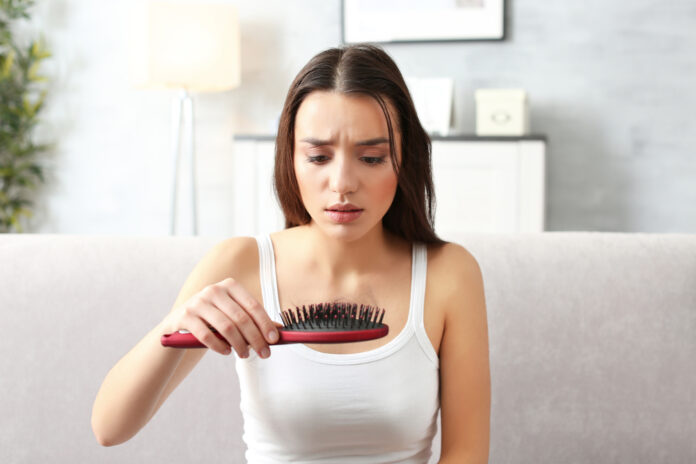There are various well-known impairments associated with COVID-19 such as loss of smell and taste sensations. Now there are reports of people complaining of hair loss after infection. Let’s discover whether COVID-19 and hair loss are related.
COVID-19 pandemic has almost passed through its peak; thankfully. Countries of the world are recovering from it. Many of the after-effects from this infectious disease are still being discovered as healthcare professionals try to learn more about the disease.
What research says about COVID-19 hair loss?
There is no conclusive data on hair loss by representative health bodies such as World Health Organization (WHO) and the Center for Disease Control (CDC). Thus, hair loss is not commonly considered a feature of COVID-19.
However, there are studies being conducted around the world to determine the prevalence and incidence of hair loss in patients of COVID-19. For example, Dr. Natalie Lambert from Indiana University School of Medicine conducted a study in collaboration with Survivor Corps.
Survivor Corps is a volunteer movement that connects people who survived COVID-19 with the medical and scientific community around the world. This forum conducted some surveys asking survivors of COVID-19 about the symptoms that they were still experiencing after recovering from the disease.
The findings of this study stated that more than one-third of survivors reported hair loss. This showed that hair loss was more prevalent in COVID-19 patients than data acquired by health representative bodies.
Results of another study by The Lancet were also astonishing as they revealed that 22 % of Covid-19 patients had reported hair loss. Results of both these studies and some others around the world have made hair loss in Covid patients a hot topic to debate. The possible causes of this hair loss are still being researched.
What caused COVID-19 hair loss?
The noticeable incidence of hair loss in COVID-19 patients has prompted healthcare professionals to understand the mechanism lying behind it. So, they are collaborating to determine the possible causes for this hair fall.
Understanding the relationship between COVID-19 and hair loss depends on extensive research. Possible explanations for this hair loss are still under research as it is right about most of the features of this disease. Yet, there is almost a consensus that COVID-19 causes acute Telogen effluvium.
Telogen effluvium is a medical term for temporary hair loss caused by some stressors. Losing some hair is a normal phenomenon. You may shred 100 -200 hairs daily. That is normal. On the other hand, Telogen effluvium is when this hair loss exceeds normal.
Generally, there are many factors that can cause Telogen effluvium. This increase in hair loss can be due to the body reflecting internal problems. There are many possible triggers for this:
- Medicines (anti-inflammatory drugs and antibiotic)
- Surgery
- History of physical and psychological stress
- Lack of sleep
- Malnutrition and weight loss
“COVID-19 puts an individual into a state of a lot of physical and psychological stress,” says Dr. Najam Jamshaid, Head of Department of Dermatology Nishtar Hospital Multan. “During this stressful state, blood flow increases towards the vital organs. The flow of blood towards the hair follicles and skin structures decreases, consequently.”
Due to decreased nutrition, the hair follicles start dying and start to fall off from their roots. This is what is termed as Telogen Effluvium in medical terms. It has been observed that COVID-19 patients see hair loss in the first two months after infection. This development is speedier than the hair loss caused by other stressful factors.
Will your hair return?
If you are feeling distressed by hair loss due to COVID-19, the good news is that this hair loss is often temporary. Always watch out for the other causes of your hair loss. If there is no other medical cause of your loss, then hair loss due to COVID-19 is temporary. “All you need is to have some patience and a little bit of care”, says Dr. Jamshaid.
“It usually lasts for three to six months. After this, hair enter into their normal cycle. Thus, the hair shredding and thinning problem should get resolved within a year from the start of it.”
So, take it easy: Your shiny hair is soon coming back.
What can you do about your COVID-19 hair loss?
Hair loss affects your self-confidence and morale. But you should neither feel embarrassed about it nor you should try to manage it on your own. First of all, it is important to make sure that your loss is more than normal. Then, it is always a good idea to visit your dermatologist.
A dermatologist will take a complete history from you. He will do your physical examination and will assess the extent and nature of hair loss. He can then rule out the other causes of hair loss. After evaluating from every aspect, he would recommend you a personalized treatment plan.
Sometimes, all you need is reassurance from an expert that your hair loss is temporary, and your hair will return to normal after a certain period. This reassurance is extremely helpful. Doctors suggest easing the stress if possible.
They will brief you about many stress reduction practices. It can be mindful meditation, yoga, etc. So, if your hair loss is being caused by stress, relieving stress will surely help you out.
If these things don’t help, then there is an option of medications. Minoxidil is one of the medications used to slow the shedding of hair. Once again, it is important to use medications only after consultation with your dermatologist.
Do have patience and keep in touch with your dermatologist. Hair loss takes many months to develop. As a result, it takes some time to get resolved.
Conclusion
It is important to remind yourself that you survived a deadly disease: your body is healing from its effects. As with every good things, hair growth takes time. Meanwhile, pick up a relaxing hobby!
Find a Home-Based Business to Start-Up >>> Hundreds of Business Listings.

















































